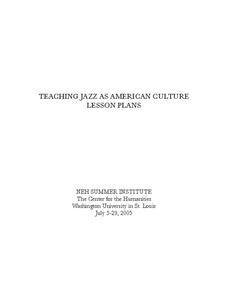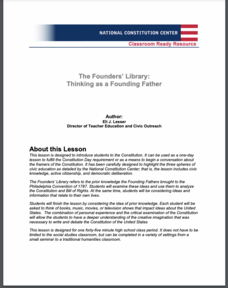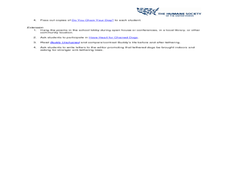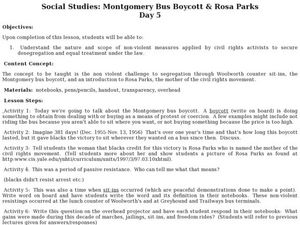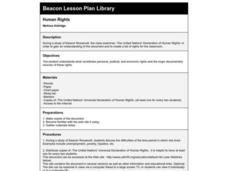Curated OER
Your Safety and Security or Your Civil Liberties - Which is More Important?
Students examine provisions of USA PATRIOT Act and controversies that led the ACLU to take legal action against the legislation. They create, conduct, and document results of a survey related to the PATRIOT Act and controversies...
Curated OER
Using Data to Determine the Location of the Stiffest Opposition to School Desegregation in the 1970's
Students analyze historical data. In this school desegregation lesson, students make predictions about opposition to desegregation, examine the provided desegregation data, and determine if their predictions were correct.
Washington University in St. Louis
Teaching Jazz as American Culture
Jazz and the City, Jazz and the Civil Rights Movement, Jazz and Gender, Jazz and Literature, Jazz and the Arts, Jazz and Film. Here's a packet of unit plans organized around themes that reflect American culture. Each unit examines how...
Curated OER
Rights and Responsibilities
Start a discussion about individual rights and responsibilities with your class. As they will find out there is a difference between a person's rights and their responsibilities. Included are four discussion questions, activity...
Curated OER
Dr. King's Dream
Learners explore life and work of Martin Luther King, Jr., reflect on section of King's "I Have a Dream" speech, discuss inequities that still exist in the United States, and create picture books about their own dreams of freedom for...
Curated OER
The Founders’ Library: Thinking as a Founding Father
Students analyze the U.S. Constitution and the Bill of Rights. In this U.S. government lesson, students examine books, movies, and music that influence them today and then investigate writings that influenced the framers of the...
Curated OER
Poetic Justice: Understanding the Life of a Tethered Dog
The Humane Society provides a lesson in which class members explore the issue of tethering dogs. Through the resources used -- a comic, a poem, and narrative and expository writings -- class members realize that messages can be conveyed...
Curated OER
African-American Soldiers After World War I: Had Race Relations Changed?
Students utilize an online database to conduct research and analyze the conditions for African-Americans before and after World War I. They consider the role of the 92nd and 93rd divisions in affecting social change.
Federal Reserve Bank
Investing in Yourself: An Economic Approach to Education Decisions
What is the difference between physical capital and human capital, and in which should you invest? While considering the concept of return on investment, take a look at the payoffs and consequences of investing in training and education.
Curated OER
Japanese-American Relocation
Consider the causes and effects that led to the internment and relocation of Japanese Americans during WWII. Learners read the story "Baseball Saved Us" and selected chapters from Farewell to Manzanar. Then, they view a slide-show, and...
Curated OER
Stem Cell Differentiation Game
This carad activity helps students explore detailed facts and scientific procedures around the human body and its cells. In this stem cell lesson, students utilize different colored flash cards to represent different types of human...
Curated OER
Understanding the Body, Day 2: Puberty
What is puberty? Get your secondary special needs students on the right track with this develpmentally appropriate lesson. They define and describe the differences between men, women, boys, and girls, discuss major events that mark...
Curated OER
Human Prehistory
Students discuss the history of humans. In this human history lesson, students describe how the placement of the continents changed and where the humans began and traveled to. They discuss interaction with Neanderthals and dogs.
Curated OER
Celebrating the Legacy of Ella Baker
Students research the life of Ella Baker and examine the importance of Civil Rights through citizen mobilization. In this rights lesson, students read the biography of Ella Baker and make suggestions of things to change in their own...
Curated OER
Rosa Parks
Students explore the life and works of Rosa Parks. In this Civil Rights instructional activity, students consider Rosa Parks' work as a philanthropist. Students then write a letter to someone that they admire for making a difference.
Curated OER
Montgomery Bus Boycott & Rosa Parks Day 5
Students study the Montgomery Bus Boycott. In this American Civil Rights lesson, students listen to a lecture about segregation, Rosa Parks, and the bus boycott. Students discuss passive resistance and its effectiveness.
Curated OER
Human Rights
Third graders study The United Nations' Universal Declaration of Human Rights and Eleanor Roosevelt.
Curated OER
The Kennedy Administration and the Civil Rights Movement
Students evaluate the Kennedy Administration's involvement in the civil rights movement. In this Civil rights lesson, students read and take notes from speeches connected to the historic March on Washington from the National Archives in...
Curated OER
Human Migration
Learners explore human migration, refugees and human rights. They read articles about immigration, create a migration journal, and participate in a mock human rights commission meeting. After collecting information about immigration,...
Curated OER
From Jim Crow To Linda Brown: A Retrospective of the African-American Experience from 1897 to 1953
Students examine African American issue between the years 1897 and 1953. In this African American history instructional activity, students research the social, economic, and political conditions of African Americans during the...
Curated OER
Eisenhower: The Contentious 1950s
Students explore 1950's America. In this American history lesson, students research the McCarthy hearings, Civil Rights, war fatigue, and economic issues of the decades. Students respond to discussion questions about topics.
Curated OER
Martin Luther King, Jr., and the Power of Nonviolence
Young scholars examine the philosophy of nonviolence developed by Martin Luther King, Jr. and how this turned into practice during the Civil Rights Movement. They compare these teachings to those of Mohandas K. Ghandi.
National Endowment for the Humanities
Slavery and the American Founding: The "Inconsistency Not to Be Excused"
High schoolers examine slavery in the revolutionary and colonial eras of the United States. In this slavery lesson, students investigate the presence of slavery in early America, the language of the Constitution, and the intent of the...
Robert F. Kennedy Center for Justice and Human Rights
Vaclav Havel: Free Expression
Develop an understanding of universal human rights, particularly the freedom of expression, with the questions and activities that analyze the conflicts of Vaclav Havel. Learners define, interpret and rephrase the human rights article in...




